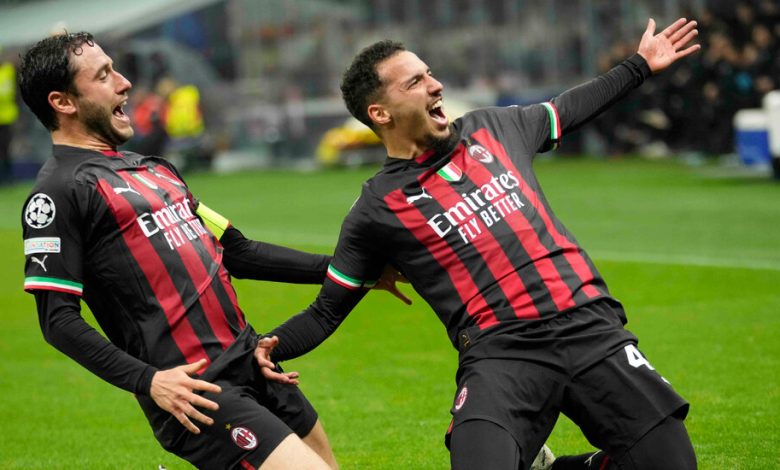On a Big Night for Italian Soccer, Milan Leads the Celebration

MILAN — If the fans just closed their eyes in the moments after the goal and let the noise wash over them, all the screams and the songs and the chants suddenly melting into the wall of sound that filled every space inside the San Siro, they would have recognized it immediately. This is what it sounded like in the good old days.
The most senior members of the home crowd would have welcomed the cacophony as an old friend, an echo of the era when Italian soccer ruled the world and A.C. Milan ruled Italian soccer. The younger ones would have grown up on the stories of those days, when challenging for the European title was an annual affair for Italian clubs, not the rarity it has become since the last time one of them laid their hands on the trophy, in 2010.
Italian soccer doesn’t get nights like this much anymore: two of its giants, Milan and Napoli, colliding in the quarterfinals of the Champions League, a day after a third, Internazionale, took one big step toward meeting the winner in an all-Italian semifinal. That was what drove the sound, what propelled Milan to the 1-0 victory it will carry into next Tuesday’s return leg in Naples.
It was what has all three teams thinking bigger nights might lie ahead.
The past few years have been pivotal for Italy’s top league, Serie A, which has not seen this kind of optimism in quite a while. There is a sense that Italy, energized by new team owners and ideas, might at last have started to reverse its slow steady decline from its peak in the 1980s and ’90s, when all the stars wanted to play in the country, and when the European champions regularly came from there.
Modern soccer has left Italy behind in many ways. The fall of its biggest clubs is a story of bad decisions and big debts, of a league that clung to tradition in a modern media age, of owners who couldn’t agree on a way forward and instead retreated into their aging stadiums while the rest of Europe built new, bet big and cashed in.
Serie A still has plenty to sell, of course: classic brands like Milan and Juventus; adventurous, attacking clubs like Napoli; stars like Napoli’s Georgian sensation, Kvicha Kvaratskhelia, and its Nigerian goal-scoring machine Victor Osimhen, but also Milan’s young wings, Rafael Leão and Brahim Díaz.
But Italian soccer still has problems to solve. Italy appears to have forgotten how to produce elite players — only four Italians started Wednesday’s game — and its clubs can no longer compete with the talent now drawn relentlessly to England by the Premier League’s TV contracts, and to leagues that have more recently offered a better, and more consistent, shot at the Champions League trophy.
It is for that reason that there is a nagging fear that the recent revivals of clubs like Milan and Napoli represent two comets instead of the structural change needed to keep pace with the riches of England’s Premier League, the relentlessness of Germany’s Bundesliga and the glamour of Spain’s La Liga.
The San Siro itself is a symbol of this tension. Beloved by preservationists and traditionalists as one of the iconic cathedrals of European soccer, it is also derided as an antiquated mausoleum of a stadium, a place so out of date that it relies on a Wi-Fi network named “3G.”
But on big nights it can still come to life. On Wednesday, Napoli controlled the first 40 minutes, pressing the action and pulling off the rare feat of simultaneously appearing to have two extra defenders and two extra attackers whenever necessary. Napoli looked very much like the team that was strolling to this year’s league title.
But while Napoli had the better of the early chances, Milan had the better of the scoreboard, courtesy of a lightning counterattack led by Díaz and finished by Ismaël Bennacer in the 40th minute.
Will moments like that change the narrative? No one can be sure. Juventus showed its rivals what a modern stadium can look like. Napoli showed them that a good team can be built on a budget. Milan, acquired last year by RedBird Capital Partners, promptly won the Serie A title for the first time in more than a decade. But momentum can be a fleeting thing.
The Premier League and the rest will come soon enough to poach Italy’s best talents and to try to beat back its teams’ advances on the field. For now, Italy will revel in big nights like this.
Big nights like Tuesday, when Inter beat Benfica, 2-0, to take a giant step toward an all-Italian semifinal against the Milan-Napoli survivor. If that comes to pass, it will ensure an Italian finalist in a competition no Italian club has won since Inter in 2010.
Big nights ahead in Serie A as Napoli looks to close out its first title since the days of Diego Maradona, and as its rivals try to lock down places in next season’s Champions League.
And big nights like Wednesday, when the grand old stadium shook, when the old noise filled every space and when Italian soccer could hear echoes of its glorious past and dream for at least another week about a few more of them in its future.
